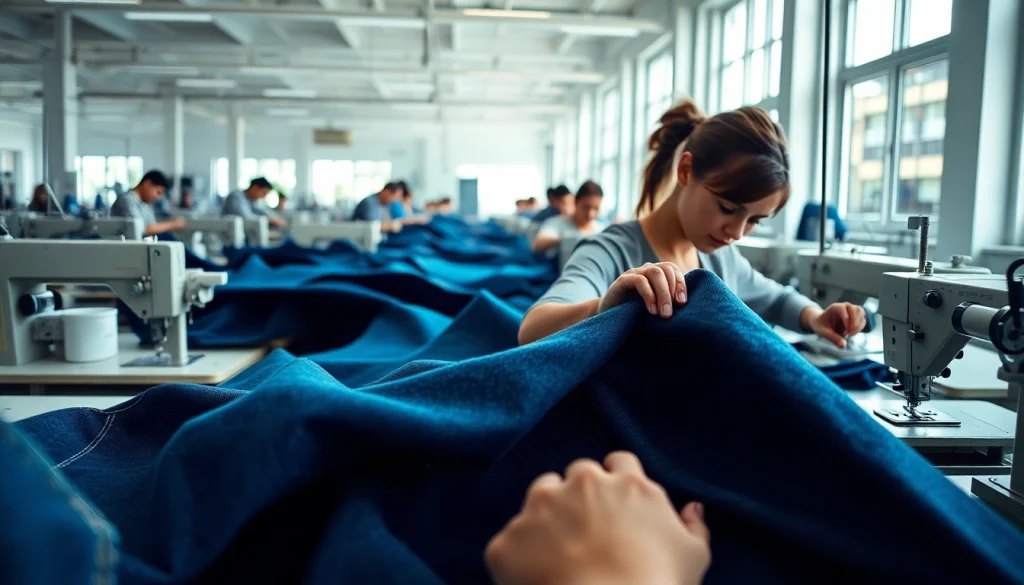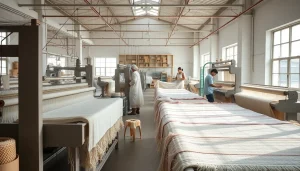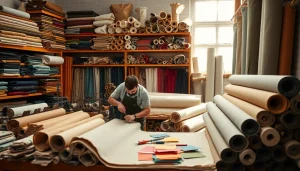Quality Insights into Leading Jeans Manufacturers and Their Processes

The Evolution of Jeans Manufacturers
History and Origins of Denim Manufacturing
The story of denim manufacturing dates back several centuries, tracing its roots to the late 17th century in the French city of Nîmes. It was here that the fabric known as “serge de Nîmes,” which eventually became known as denim, was first created. This durable cotton twill fabric was initially crafted for workwear due to its sturdiness and resilience. It wasn’t until the mid-19th century that denim began to evolve into the iconic fabric we recognize today, thanks in large part to the invention of blue jeans by Levi Strauss and Jacob Davis in 1873. This transformative period marked the birth of a new cultural phenomenon surrounding denim, paving the way for various jeans manufacturers to enter the market.
Key Milestones in Jeans Production
Throughout the 20th century, jeans production witnessed significant milestones that shaped the industry. Initially adopted by laborers and miners for their practicality, jeans gained popularity across social classes, particularly during the 1950s and 1960s as a symbol of rebellion among the youth. The 1970s and 1980s heralded the move towards mass production techniques, allowing manufacturers to cater to a growing demand while keeping costs down.
In the late 20th century, the industry adapted to changing consumer preferences, with a shift towards diverse styles and fits. The advent of technology further revolutionized jeans manufacturing, introducing innovative techniques such as laser processing and automated cutting. These advancements not only enhanced efficiency but also allowed manufacturers to maintain high-quality standards, leading to a diversified market filled with styles from casual to high-fashion.
How Modern Technology Influences Jeans Manufacturing
Modern technology plays a crucial role in the denim production process, streamlining operations and improving product quality. State-of-the-art machinery is now utilized for cutting, sewing, and finishing jeans, which reduces production time and waste. Additionally, technologies such as 3D design and virtual prototyping have transformed the design phase, enabling manufacturers to create accurate representations of their products before they are physically produced.
Furthermore, the integration of sustainable practices through technology, such as waterless dyeing processes and eco-friendly materials, has become paramount. Jeans manufacturers are increasingly focusing on reducing their environmental footprint, which resonates well with the growing consumer demand for sustainable fashion.
Identifying the Best Jeans Manufacturers
Criteria for Selecting Quality Manufacturers
When searching for reliable jeans manufacturers, several criteria must be considered to ensure quality and alignment with brand values. jeans manufacturers should be evaluated based on their experience and reputation in the industry, as well as their ability to deliver consistent product quality and adhere to tight deadlines. Additionally, potential manufacturers should offer transparency in their production processes and provide certifications that demonstrate ethical labor practices.
Another vital aspect is their capability to accommodate customization and unique designs. The best manufacturers are those who can work closely with brands to innovate and produce distinctive products that stand out in an increasingly competitive market.
Understanding Manufacturer Certifications
Various certifications play a significant role in assessing the credibility and practices of jeans manufacturers. Certifications such as ISO 9001 (quality management) and WRAP (Worldwide Responsible Accredited Production) indicate a commitment to quality and ethical manufacturing standards. Furthermore, certifications related to sustainability, such as OEKO-TEX® and GOTS (Global Organic Textile Standard), highlight a manufacturer’s adherence to environmentally friendly practices. Partnering with certified manufacturers not only benefits the environment but also enhances a brand’s reputation by aligning with consumer values.
Top Regions for Jeans Manufacturers
The global denim manufacturing landscape features various regions that have established themselves as key players in the industry. While countries like China, India, and Bangladesh are known for their large-scale production capacity, the United States is recognized for its focus on high-quality craftsmanship and premium materials. Each region offers unique advantages: for instance, Asia provides lower production costs and speedy turnaround times, while American manufacturers often emphasize sustainable practices and ethical labor conditions.
Moreover, emerging markets in Africa and South America are beginning to establish themselves, offering competitive advantages like reduced transportation costs for nearby countries and a growing workforce skilled in textile production.
Production Techniques Used by Jeans Manufacturers
Traditional vs. Innovative Manufacturing Methods
Historically, jeans manufacturing involved various traditional techniques that relied heavily on manual labor. Techniques like hand-sewing and artisanal craftsmanship contributed to the unique character of each pair of jeans. However, as the demand for jeans increased globally, manufacturers began adopting innovative methods to enhance efficiency and meet consumer expectations.
Modern manufacturers utilize automated cutting machines, laser technology for finishing, and advanced sewing equipment that streamline production while reducing labor costs. This shift from traditional to innovative methods allows manufacturers to produce a higher volume of jeans at a consistent quality while also decreasing production time.
Sustainable Practices in Jeans Manufacturing
Sustainability has emerged as a critical focus area for jeans manufacturers, driven by changing consumer preferences and environmental considerations. Traditional denim production typically involved significant water usage and harmful chemical processes. However, many manufacturers are evolving to adopt practices that minimize environmental impact.
Incorporating water-saving technologies, eco-friendly dyes, and organic materials can significantly reduce the environmental footprint of denim production. For example, methods such as closed-loop water systems and alternative dyeing processes not only conserve resources but also enhance the appeal of products to environmentally conscious consumers. Furthermore, recycling programs that utilize post-consumer denim to create new products symbolize a holistic approach to sustainability.
Quality Control Measures in Production
Quality control is fundamental in jeans manufacturing to maintain standards and ensure customer satisfaction. Effective quality control measures include pre-production inspections, in-process monitoring, and final product assessments. Manufacturers employ skilled quality assurance teams that conduct thorough checks at each stage of production, from fabric sourcing to the final assembly.
Advanced technologies like 3D scanning and computer-aided design systems also play a crucial role in ensuring quality consistency. By leveraging these technologies alongside robust manual checks, jeans manufacturers can significantly reduce variations and defects, ensuring that each product meets the established quality benchmarks.
Challenges Faced by Jeans Manufacturers
Global Supply Chain Issues
The denim industry, like many others, faces challenges associated with complex global supply chains. Factors such as geopolitical tensions, transportation disruptions, and raw material shortages can hinder production timelines. Manufacturers must be agile, adapting to unforeseen circumstances while maintaining product quality and customer satisfaction.
To mitigate these risks, companies are emphasizing local sourcing and diversifying their supplier networks. This diversification not only reduces dependency on a single source but also allows manufacturers to maintain production capabilities in the face of supply chain disruptions.
Adapting to Market Changes
The fast-paced fashion industry necessitates that jeans manufacturers remain agile and responsive to market changes. Shifting consumer preferences toward sustainable and ethically produced fashion require manufacturers to quickly adapt their practices and offerings. This adaptability is essential in avoiding inventory hold-ups and ensuring relevance in a competitive marketplace.
Moreover, the rise of e-commerce has shifted consumer behavior, leading manufacturers to consider direct-to-consumer strategies that bypass traditional retail channels. Embracing digital platforms and leveraging market data can help manufacturers remain ahead of trends while catering to a broader audience.
Labor and Environmental Considerations
As awareness of labor practices and environmental impact continues to grow, jeans manufacturers face increasing pressure to improve working conditions and adopt sustainable practices. Consumers are more informed and selective, often opting for brands that prioritize ethical production and environmental stewardship. This trend compels manufacturers to scrutinize their labor practices, ensuring compliance with fair labor standards and improving workplace conditions.
Additionally, manufacturers are urged to consider their environmental impact, implementing sustainable practices that minimize waste, reduce water consumption, and ensure safe use of chemicals throughout the production process.
The Future of Jeans Manufacturers
Trends Shaping the Denim Industry
As we move further into the 21st century, several trends are shaping the future of jeans manufacturers. The shift towards sustainability continues to drive innovation, as companies explore new materials and recycling techniques to cater to eco-conscious consumers. Moreover, customization is becoming increasingly popular, allowing brands to create unique, tailored products that resonate with individual consumers.
Technological advancements such as artificial intelligence and augmented reality are also being integrated into the manufacturing process, enhancing the design experience while providing actionable insights into consumer preferences.
Technological Advances on the Horizon
The future for jeans manufacturers appears promising, with ongoing technological innovations set to revolutionize the industry. The introduction of smart textiles, which incorporate electronic components into fabric, hints at a new frontier for denim. These innovations have the potential to create multifunctional garments that could amplify the user experience.
Furthermore, developments in Artificial Intelligence and machine learning are likely to streamline processes, allowing for improved forecasting and manufacturing efficiency. Such advances will help companies respond swiftly to consumer demands while minimizing waste through predictive analytics.
Consumer Preferences and Market Impact
The evolving landscape of consumer preferences is shaping the strategies of jeans manufacturers. Today’s consumers, often seeking personalized experiences and socially responsible products, are influencing the production direction within the denim industry. Companies that effectively integrate consumer feedback into their design and production processes stand to gain a competitive edge.
In conclusion, the denim industry is at a significant junction, with challenges and opportunities influencing the practices of jeans manufacturers. By embracing sustainability, leveraging technology, and responding to consumer needs, manufacturers can continue to thrive in a dynamic marketplace while promoting responsible production practices.







